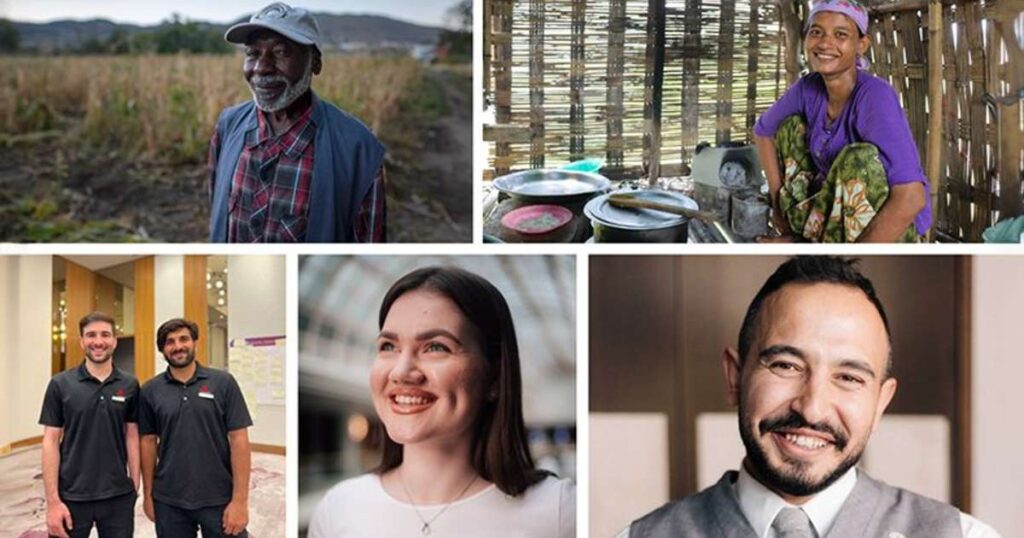According to the United Nations Refugee Agency (UNHCR), by June 2024 on World Refugee Day over 120,000,000 people will have been forcedly displaced. This number is higher than ever before, as global conflicts and humanitarian crises–including the climate crisis–continue to force people around the world to flee their homes. Families who have been displaced by war and natural disasters are forced to resettle into new communities. Finding work is one of the most important, difficult, and rewarding tasks in order to support their families and establish roots.
Refugees who are looking for work face unique challenges and obstacles, despite their experience and qualifications. Refugees face many barriers to employment, including language barriers, non-recognition for certifications and unfamiliar hiring practices. Harvard Business Review (HBR). estimated It is estimated that in the US there are 27 million hidden workers who are denied employment opportunities in part because of rigidly structured hiring processes and policies.
It is evident that these potential employees bring a wide range of skills to the workplace. Refugees bring a lot of value to an organisation through their unique skills and expertise in specific occupations, languages, and cultural experience. Hiring, promoting and investing in talents with diverse skill sets can help companies meet the challenges of today’s market and their ever-changing workforce requirements.
It is time for the private sector, therefore, to be more welcoming to refugees. Businesses benefit when companies celebrate and recognize the contributions made by newcomers in communities and business. Hospitality companies are leading by example in this area and showing the impact. Hospitality companies are by nature aware of the power “welcome” has. By hiring diverse employees you not only benefit the travel industry but also make communities more welcoming by increasing language, knowledge sharing and cultural understanding. The US Bureau of Labor Statistics estimates there are 15 million hospitality workers The US. The sector, which has a significant role for immigrants and refugees, has been an important entry point for newcomers to the US.
Marriott International (and the International Rescue Committee) have witnessed first-hand the impact of meaningful employment and training opportunities around the country. Launched in 2016, the IRC and Marriott’s Hospitality Link program provides refugee, immigrant and asylum-seeking English-language-learner adults with training and employment coaching to help them prepare for, secure, and grow careers in hospitality. Marriott has supported the Hospitality Link program in helping nearly 1,000 immigrants to the US prepare for careers. This support was provided across 10 different cities. As a result, these individuals are working in hotels, resorts, and restaurants across America–building bright futures and filling critical jobs in one of the nation’s fastest growing industries.
As the global business landscape grows more competitive and humanitarian needs rise, businesses have an imperative to invest in matching opportunities with the right talent– with a focus on inclusivity.
Businesses can help refugees by adopting these approaches:
- Hire the right peopleBy helping people displaced to restart their careers, the organizations help entire communities thrive. Marriott has hired over 1,000 refugees in dozens of hotels across Europe since the beginning of the Ukraine war. Marriott’s future plans include a focus on creating jobs for refugees. commitment to hiring more than 3,000 refugees globally by 2026 It is clear that, when done properly, supporting refugees helps organizations to fill labor gaps, diversify their skill set, and improve productivity.
- On the job trainingIt’s not sufficient to hire refugees and keep them at entry-level jobs. The same support, investment, and opportunity for career advancement as their peers can be provided to refugees by companies. This will allow them to grow and reestablish professionally, while also meeting business needs.
- Inclusive talent acquisition practicesIn order to promote career opportunities, it can be advantageous for companies to use their core values to set the example. Marriott is a good example. career siteThis website provides information on opportunities available for refugees to find work in the US. We have witnessed first-hand how strong local relationships between Marriott’s hiring managers and IRC’s employment specialists can help overcome barriers to employment. For example, offering flexible schedules for childcare and transportation requirements – creating an inclusive and accessible work environment and a larger talent pool.
Marriott Bonvoy Members who want to make a difference can donate their points on to the IRC or other nonprofits. giving.marriott.com. The private sector, through initiatives that are solutions-oriented, such as the IRC or Marriott’s Hospitality Link Program, can catalyze lasting changes and transform lives of displaced persons, as they rebuild and enrich their communities.
Bernice Chan
Marriott International Senior Manager of Corporate Communications
Marriott


